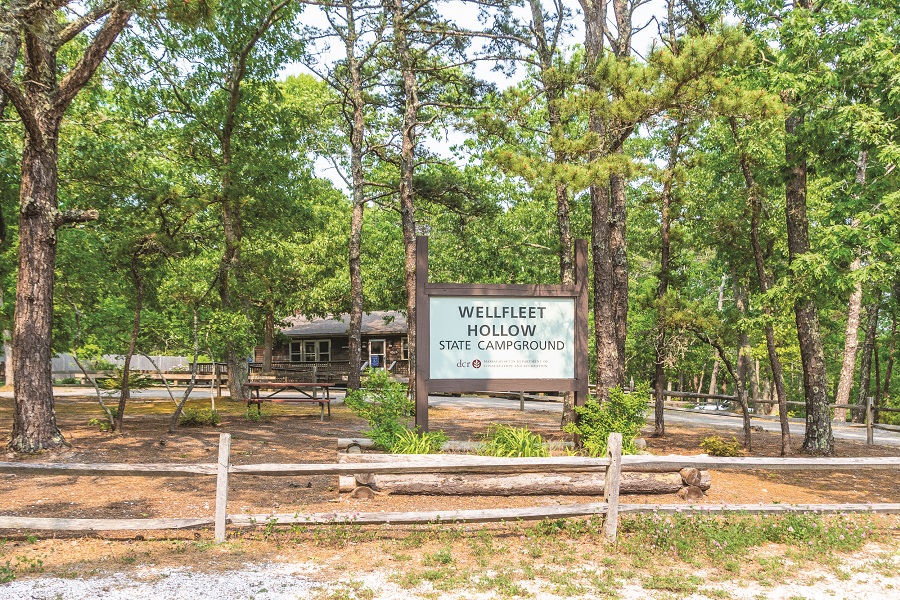This article was updated with new information on June 9, 2023.
WELLFLEET — Those looking to book a cheap woodsy getaway this summer at Wellfleet Hollow State Campground will encounter an alert on the Dept. of Conservation and Recreation (DCR) website: “Due to a lack of staff, Wellfleet Hollow State Campground will only operate on Thursday, Friday, and Saturday nights through the end of the season.”
Last year, the same disclaimer confronted campers looking to sleep under the Wellfleet stars for longer than a weekend.

Officials at the DCR at first declined to speak to a reporter. Instead, the department’s deputy communications director, Ilyse Wolberg, issued a memo listing all state-run campgrounds on the Cape and how to book a campsite. She added that hiring full-time seasonal staff has been an issue for the agency, necessitating a switch to the weekend schedule. DCR Communications Director Chloe Gotsis later said that the failure to offer an interview was the result of a misunderstanding. “We want to work with you and help you understand all of the great work we are doing,” Gotsis said.
The DCR currently runs four campgrounds on Cape Cod: Nickerson State Park in Brewster, Scusset Beach State Reservation in Bourne, Shawme-Crowell State Forest in Sandwich, and Wellfleet Hollow. According to the DCR’s reservation booking page, all other Cape campgrounds are open weekdays.
The state acquired the Wellfleet campground at 180 Old Kings Highway in 2018 from the Paine family, who ran Paine’s Campground for 60 years. After winning a costly 21-year legal battle against the Sexton family over title to parts of the 30-acre site, the Paines sold the campground to the state for $3.6 million in a friendly eminent domain taking. K.C. Myers reported in a Provincetown Banner article at the time that Wellfleet Assessor Nancy Vail assessed the campground at $2.15 million.
According to Irene Paine, sister of longtime campground owner Robert “Buddy” Paine, the family sold to the state because DCR would continue running it as a campground. “My family was happy because it wasn’t going to be bought by a developer,” she said.
But Wellfleet Hollow’s hours disappoint Paine. “It’s sad to me,” she said. “There were so many people who came down for a week or two, and now they can’t. We didn’t realize they were too short on people to operate it, and we didn’t realize they weren’t going to let you stay there for the summer.”
Many Wellfleet locals first came to town as campers at Paine’s, including playwright Gip Hoppe, builder Bruce Birchall, and activist Harriet Arnoldi, according to Paine. But current visitors looking to pitch a tent are stymied by the limited hours at Wellfleet Hollow, said part-time Wellfleet resident Richard Ewald.
With access to nearby White Crest and Lecount Hollow beaches, the Cape Cod Rail Trail, and a short bicycle ride to Duck Pond, the forested campground charges only $22 a night — a rare affordable alternative to the high prices of hotels and rentals. But the campground’s partial closure, Ewald said, is “another example of how people of modest means are being priced out of the Cape experience. It’s very discouraging to have that resource right there and not be able to use it.”
Ewald owns a one-bedroom cottage in South Wellfleet near Wellfleet Hollow and wishes that visiting friends and family could camp there. He said he grew up camping with his family at state parks across New England for weeks at a time.
“State parks were our homes away from home,” he said. “I can’t stand that kids are being deprived of learning how to start, tend, and put out a campfire. To have their clothes smell of woodsmoke, and to sleep on the ground and eat every meal outside.”
According to Mass.gov’s job listings, there are three current job openings at Wellfleet Hollow. The DCR is looking for two full-time seasonal laborers, each paid $1,393 biweekly, according to the posting. A full-time seasonal park supervisor would be paid $2,050 biweekly.
When her family ran the campground, Paine said, full-time employees came with their RVs and camped out on one of the campground’s 100-plus sites for the summer. But according to the DCR’s Gotsis, current employees of the campground are not permitted to live there “for legal reasons.”
Paine sees this policy as problematic if the DCR hopes to recruit staff. “If they want to run these properties, they have to let people stay there,” she said. “There is such a shortage of people to work these summer jobs because they don’t have places to live. If they changed that rule, there would be no problem.”
The DCR’s problems clearly extend beyond Cape Cod. According to a 2023 camping season announcement issued by the DCR, state campgrounds at Mount Washington State Forest, Waquoit Bay, Beartown State Forest, and Mt. Greylock State Reservation are all closed for the 2023 season. Camping on the Boston Harbor Islands is also limited to Peddocks Island only. An article in the Mass. Conservation Voters blog in June 2020 announced the closure of seven campgrounds across the state due to the pandemic, including Mt. Greylock, Waquoit Bay, Mt. Washington, and Beartown. Mt. Washington and Waquoit Bay have remained closed since then.
The DCR’s budget for fiscal year 2023 was $113 million; its revenues for that year were $25.6 million, according to the state’s final budget report for 2023. Historic budgets in recent years show that the DCR’s budget has increased slightly, and its revenues have decreased somewhat. In 2022, its budget was $112.3 million with $31 million in revenues. In 2020, the DCR had a budget of $97.1 million. It made $32.2 million that year.
